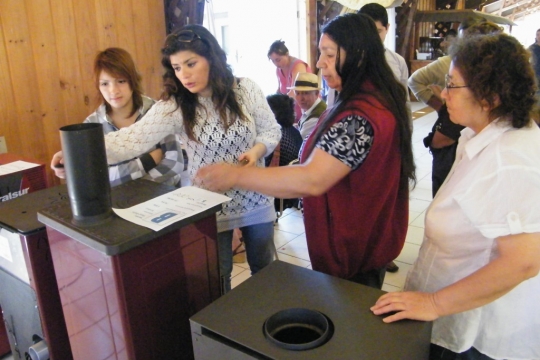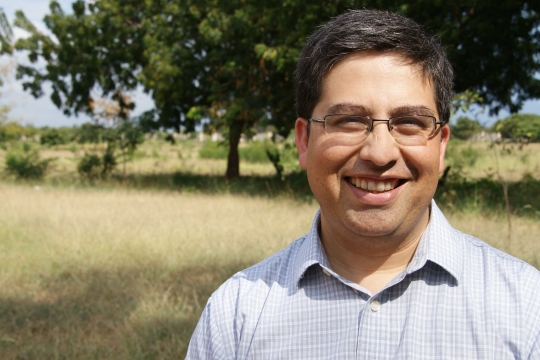Air pollution caused by wood-burning in homes for cooking and heating purposes is one of the most important environmental problems in Chile, affecting thousands of families and causing early mortality. EfD Chile researchers study families’ and producers’ economic behavior, and advise the government to incorporate effective economic incentives to design better pollution control policies.
Incomplete combustion of wood creates pollution from particulate matter. This has a huge impact on health, creating respiratory and cardiovascular problems. In winter months, more than 25 cities in southern Chile have concentrations of particulate matter that are double or triple the national and international health standards.
The government develops major pollution control plans, including measures to reduce the use of wood and to promote the replacement of old stoves by providing subsidies to buy cleaner and more efficient stoves. EfD Chile, or the Research Nucleus on Environmental and Natural Resource Economics (NENRE), hosted by University of Concepción, Chile, has been involved in this process by contributing to the design of a subsidy system that can be scaled up to all families in the most cost-effective manner.
 Dr. Hugo Salgado
Dr. Hugo Salgado
‘We have conducted theoretical and empirical research, applied surveys and even implemented a pilot program with real subsidies given to families to replace their old stoves. We have provided advice to the Ministry of Environment about how to correctly demonstrate the benefits of pollution control plans and how to incorporate social issues and participation of different stakeholders in the policy implementation process’, says Dr Hugo Salgado, EfD Chile Research Fellow and Associate Professor at University of Talca, Chile.
EfD Chile researchers have found that families are willing to spend more money for cleaner technology and improved air quality, but not enough to trigger real change. Families need a partial subsidy to take action and use drier wood and cleaner stoves. The findings also show that companies respond to the incentive of subsidies. Sellers of equipment quickly computed which model of stoves would result in the greatest profit, and offered a discount to families to buy this model. The researchers’ advice to policy makers is to set rules in terms of maximum amount of pollution of stoves that can be sold in local markets. Recently, such a new regulation that set standards for wood stoves has been implemented.
‘We also need education campaigns such that families understand the importance of using dry wood and how to operate their stoves to minimize the effects on air pollution. Some simple changes of behavior can have a big impact on air quality’, says Dr Salgado.
The Ministry of Environment has calculated that benefits can be up to five times the cost of implementing the measures proposed in pollution control plans. Besides public health effects, families can benefit from saving money on wood expenses when they use better technology and higher quality wood. Researchers at EfD Chile are currently advising the ministry about how to correctly value different benefits, for example, the effects on agriculture productivity, infrastructure, buildings and visual values, and how to incorporate these in the socioeconomic analysis of new regulations.
‘One of the most important benefits is avoiding the future cost of doing nothing today. As cities grow, the demand for energy increases and the air pollution problem gets worse. Currently, cities have started to prohibit the use of wood on critical days. However, this restriction more seriously affects low income families that do not have alternative sources of clean energy for heating their houses. To find an alternative to the wood-burning prohibition, and in that way protect poor families, we need to start acting today to reduce pollution problems by developing clean and affordable technology and fuels’, says Hugo Salgado.
EfD Chile/NENRE researchers have been able to publish a number of scientific papers that contribute to the literature on the design and implementation of air pollution control programs. And, they now have a better understanding of one of the most important environmental problems in Chile, caused by the behavior of thousands of families.
‘Sandra Briceño was the first student who worked on this subject in our program. We are proud that she is now the chief of the Environmental Economics Department at the Ministry of Environment, in charge of the design of these pollution control programs’, says Hugo Salgado.
By Karin Backteman
Researchers involved: Carlos Chávez, Walter Gómez, Hugo Salgado and Felipe Vásquez.
Academic Journal Articles:
Chávez, C., W. Gómez and S. Briceño. 2009. ‘Costo-Efectividad de Instrumentos Económicos para el Control de la Contaminación: El caso del uso de leña’. Cuadernos de Economía 46: 197-224.
Chávez, C., J. Stranlund and W. Gómez. 2011. ‘Controlling urban air pollution caused by households: Uncertainty, prices and income’. Journal of Environmental Management 92: 2746-2753.
Gómez, W., S. Yep and C. Chávez. 2013. ‘Subsidios a hogares para inducer adopción de tecnologías de combustion de leña más eficiente y menos contaminantes: Simulación para el caso de Temuco y Padre Las Casas’, Estudios de Economía 40(1): 21-52.
Gómez, W., H. Salgado, C. Chávez and F. Vásquez. 2014. ‘Using stated preference methods to design cost-effective subsidy programs to induce technology adoption: An application to a stove program in southern Chile’, Journal of Environmental Management 132: 346-357.
Government reports:
Política Ambiental con regulación imperfecta. Teoría y aplicación al problema de contaminación del aire en el centro-sur de Chile (2008 - 2009), Proyecto FONDECYT 1080287.
Diseño y Evaluación de Instrumentos Económicos para Apoyar la Producción, Comercialización y Uso de Leña Seca. Ejecutado para Conama Región de la Araucanía (2008)
Diseño de un Programa de Recambio de Artefactos Existentes que Combustionan Leña por Tecnología Menos Contaminante, en las Comunas de Temuco y Padre Las Casas. Ejecutado para Conama Región de la Araucanía (2009)
Elasticidad precio-demanda de equipos que combustionan leña en las comunas de Temuco y Padre Las Casas. Ejecutado para Conama Región de la Araucanía (2010)
Diseño, implementación y evaluación de un programa piloto de recambio de actuales tecnologías residenciales de combustión a leña por tecnologías mejoradas, en las comunas de Temuco y Padre las Casas. Ejecutado para el Ministerio de Medio Ambiente (2010-2011)
Medición de calefactores a leña del estudio incentivos para el recambio voluntario de equipos de combustión de leña en Temuco y Padre Las Casas. Ejecutado para el Ministerio de Medio Ambiente (2011-2012)
Identificación, diseño y evaluación de factibilidad de implementación de instrumentos económicos para promover el recambio masivo de artefactos a leña. Ejecutado para el Ministerio de Medio Ambiente (2012-2013).

